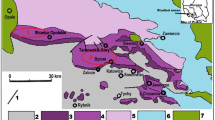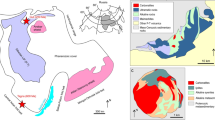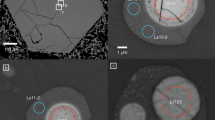Abstract
THE lava from Fort Portal in western Uganda, recently described by von Knorring and Du Bois1, was considered to be carbonatitic in view of the high carbonate content and its agreement with the characteristic trace element pattern as observed among true carbonatites, which are in the main calcitic or dolomitic rocks. In pure carbonatite rocks, significant elements like iron, titanium, zirconium and niobium may be accidental or regional to some degree, whereas elements like strontium, barium, rare earths and phosphorus seem to belong to the earlier (primary) constituents of carbonatite magmas.
This is a preview of subscription content, access via your institution
Access options
Subscribe to this journal
Receive 51 print issues and online access
$199.00 per year
only $3.90 per issue
Buy this article
- Purchase on Springer Link
- Instant access to full article PDF
Prices may be subject to local taxes which are calculated during checkout
Similar content being viewed by others
References
von Knorring, O., and Du Bois, C. G. B., Nature, 192, 1064 (1961).
Author information
Authors and Affiliations
Rights and permissions
About this article
Cite this article
VON KNORRING, O. Geochemical Characteristics of Carbonatites. Nature 194, 860–861 (1962). https://doi.org/10.1038/194860b0
Issue Date:
DOI: https://doi.org/10.1038/194860b0
This article is cited by
-
The role of liquid immiscibility in the genesis of carbonatites ? An experimental study
Contributions to Mineralogy and Petrology (1980)
-
Fresh Natro Carbonatite Lava from Oldoinyo L'engai
Nature (1963)
Comments
By submitting a comment you agree to abide by our Terms and Community Guidelines. If you find something abusive or that does not comply with our terms or guidelines please flag it as inappropriate.



